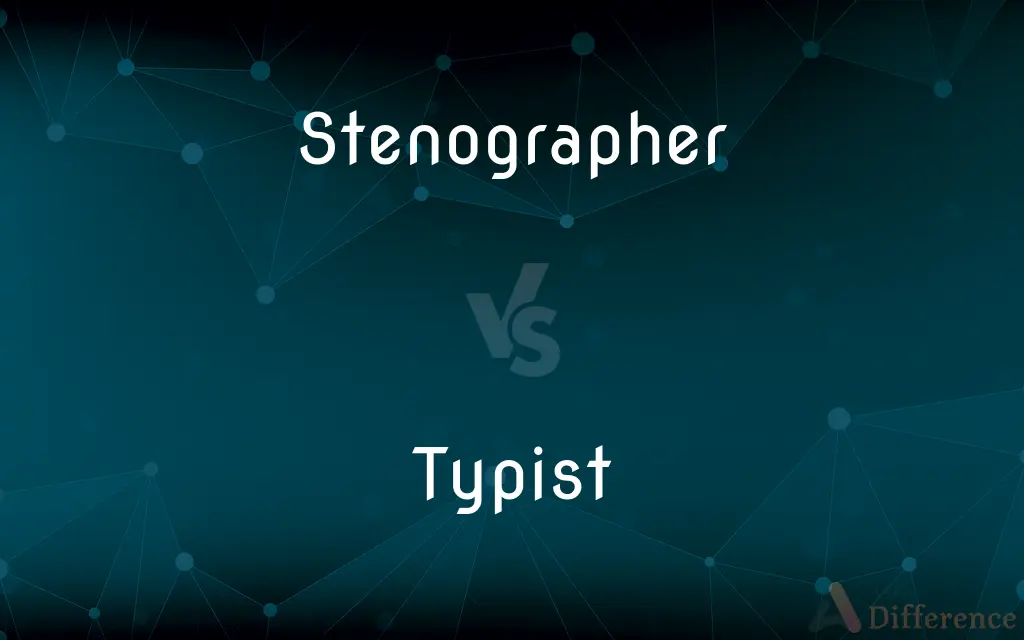Stenographer vs. Typist — What's the Difference?
Edited by Tayyaba Rehman — By Fiza Rafique — Updated on May 4, 2024
A stenographer records spoken words in shorthand or with a stenotype machine, used often in legal settings, while a typist inputs text using a keyboard, typically for documents and correspondence.

Difference Between Stenographer and Typist
Table of Contents
ADVERTISEMENT
Key Differences
Stenographers specialize in transcription, capturing speech at high speeds using shorthand notation or stenotype machines, which is crucial in courtrooms or during official proceedings. On the other hand, typists input written or printed material into computers or typewriters, focusing primarily on speed and accuracy.
The training for stenographers includes mastering shorthand systems or learning to operate specific equipment like stenotype machines, which allow for rapid transcription. Conversely, typists require less specialized training, with a focus on typing speed and familiarity with different document formats.
Stenographers often play a critical role in legal proceedings, where verbatim records are necessary for the integrity of the judicial process. In contrast, typists are employed across various industries for general office tasks, including composing emails, creating reports, and document management.
Due to the specialized nature of their skills, stenographers may also perform additional roles like real-time captioning for broadcasts or providing CART services (Communication Access Realtime Translation) for the deaf and hard of hearing. Meanwhile, typists might also manage data entry, file management, and other clerical duties.
The demand for stenographers is highly concentrated in fields where precise, official records are essential, such as in courts or parliamentary settings. Typists, however, find opportunities in a broader range of sectors, reflecting the ubiquitous need for typed documents and correspondence.
ADVERTISEMENT
Comparison Chart
Primary Role
Transcribing speech verbatim.
Typing written content into digital format.
Skills Required
Shorthand, operation of stenotype machines.
Fast and accurate typing, document formatting.
Main Equipment
Stenotype machine, shorthand notebook.
Computer, typewriter.
Key Industries
Legal, broadcasting, accessibility services.
Various industries including business, legal, and publishing.
Additional Roles
Real-time captioning, CART services.
Data entry, file management.
Compare with Definitions
Stenographer
Essential in legal settings for accurate records.
Stenographers ensure that nothing is lost in legal proceedings.
Typist
Focuses on speed and accuracy.
Accuracy is as important as speed for a professional typist.
Stenographer
A professional who transcribes speech in shorthand.
The court stenographer recorded every word during the trial.
Typist
Supports office tasks through fast typing skills.
The typist handled all the correspondence efficiently.
Stenographer
Trained in shorthand notation.
She used her shorthand skills to keep up with the rapid conversation.
Typist
Often involved in data entry and document management.
Part of her job as a typist included organizing the digital archives.
Stenographer
Provides real-time transcription services.
Stenographers often provide live captioning for television broadcasts.
Typist
A professional who types documents from written sources.
The typist prepared all the reports for the meeting.
Stenographer
Uses a stenotype machine to capture fast-speaking dialogue.
The stenographer's fingers flew across her stenotype at the conference.
Typist
Works with digital or typewriter keyboards.
He was recognized as the fastest typist in the office.
Stenographer
One skilled in stenography, especially one employed to transcribe court proceedings verbatim.
Typist
One who operates a typewriter.
Stenographer
Someone skilled in the transcription of speech (for example, a secretary who takes dictation).
Typist
A person who types, a clerical worker who writes letters, etc., using a typewriter.
Stenographer
One who is skilled in stenography; a writer of shorthand.
Typist
A person who operates a typewriting machine; a typewriter.
Stenographer
Someone skilled in the transcription of speech (especially dictation)
Typist
Someone paid to operate a typewriter
Common Curiosities
What skills are necessary for a typist?
Typists need to be proficient in typing quickly and accurately, and often need to know various document formats.
Can typists work in any industry?
Yes, typists can work in nearly any industry that requires document typing and data entry.
Are stenographers and typists the same?
No, stenographers specialize in verbatim transcription of speech, while typists focus on inputting text from written sources.
What are some common tasks for typists?
Common tasks include typing reports, correspondence, managing databases, and formatting documents.
Where do stenographers typically work?
They commonly work in legal settings, broadcasting, and accessibility services.
What does a stenographer do?
A stenographer transcribes spoken words into shorthand or using a stenotype machine, often in legal settings.
What type of training do stenographers undergo?
Stenographers receive specialized training in shorthand and the use of stenotype machines.
How do stenographers record so quickly?
Stenographers use shorthand and stenotype machines, which allow them to keep pace with normal speaking speeds.
What is shorthand in stenography?
Shorthand is a method of writing quickly by using symbols or abbreviations for phrases and words.
Is typing a major part of a stenographer's job?
Yes, but it involves typing shorthand notes or using specialized stenotype machines.
Share Your Discovery

Previous Comparison
Rebirth vs. Reincarnation
Next Comparison
Groaner vs. MoanerAuthor Spotlight
Written by
Fiza RafiqueFiza Rafique is a skilled content writer at AskDifference.com, where she meticulously refines and enhances written pieces. Drawing from her vast editorial expertise, Fiza ensures clarity, accuracy, and precision in every article. Passionate about language, she continually seeks to elevate the quality of content for readers worldwide.
Edited by
Tayyaba RehmanTayyaba Rehman is a distinguished writer, currently serving as a primary contributor to askdifference.com. As a researcher in semantics and etymology, Tayyaba's passion for the complexity of languages and their distinctions has found a perfect home on the platform. Tayyaba delves into the intricacies of language, distinguishing between commonly confused words and phrases, thereby providing clarity for readers worldwide.












































